Moment's Notice
Reviews of Recent Media
(continued)
Craig Taborn + Nels Cline + Marcus Gilmore
Trio of Bloom
Pyroclastic 42
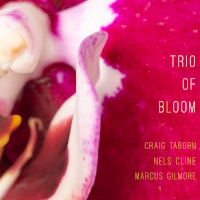 This fabulous trio could just as easily be called The Whiz Kid Three, so renowned is each member for wizardry and instrumental fearlessness. The entire record is shot through with a kind of brimming intensity and an audible joy. A simply sizzling drum groove opens up “Nightwhistlers,” the romping first track (with an unexpected, high lonesome ending). And before long you realize that it’s going to be tough to figure out where Cline’s fretwork ends and Taborn’s mad keyboard science begins. That’s a treat, by the way, not a demerit. These guys were simply made to play together, Cline’s balance between gonzo space rock and sensitive melodicism pairing so well with Taborn’s multi-keyboard layering. Gilmore’s crisp drumming makes for just the right stitching, with tasty pockets, winning abstraction, and killer feel.
This fabulous trio could just as easily be called The Whiz Kid Three, so renowned is each member for wizardry and instrumental fearlessness. The entire record is shot through with a kind of brimming intensity and an audible joy. A simply sizzling drum groove opens up “Nightwhistlers,” the romping first track (with an unexpected, high lonesome ending). And before long you realize that it’s going to be tough to figure out where Cline’s fretwork ends and Taborn’s mad keyboard science begins. That’s a treat, by the way, not a demerit. These guys were simply made to play together, Cline’s balance between gonzo space rock and sensitive melodicism pairing so well with Taborn’s multi-keyboard layering. Gilmore’s crisp drumming makes for just the right stitching, with tasty pockets, winning abstraction, and killer feel.
While there are some clearly composed sections to these tunes, the bulk of the music here is energetically improvised. The record has impressive range, too. They spend a lot of times in shimmering pastoral climes, like “Unreal Light,” which sounds like flashes and glints converted to sound. Similarly, the atmospheric “Breath” wouldn’t be out of place on a 1970s John Abercrombie platter, while “Bloomers” is a wondrous 10-minute piece that recalls The Necks with different instrumentation. Whatever the context, there’s exuberance to this music and the trio clearly have a blast playing together. Each one individually has a huge tonal range, bringing the funk on “Queen King” and “Eye Shadow Eye,” or conjuring up fierce skronk on “Gone Bust” or “Why Canada.” It’s as much about color and tone and sensitivity as it is about the great cosmic swirl. By the end of it, you realize you are indeed in some kind of wonderland overgrowth. Killer stuff.
–Jason Bivins
Webber Morris Big Band
Unseparate
Out Of Your Head OOYH37
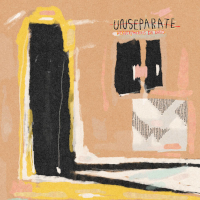 Unseparate marks the second release from the Webber Morris Big Band, one of the most daring and inventive large groups on the scene, and a worthy successor to the excellent Both Are True (Out Of Your Head, 2020). Like its predecessor it includes compositions from both the principals – reed women Anna Webber and Angela Morris. As per convention, the 11 tracks expose the talents of the entire 19-member band in solo or duet spots. But while there are standout individual features aplenty, the real story lies in the kaleidoscopic orchestral textures: lines that collide, refract, and realign into startlingly fresh shapes.
Unseparate marks the second release from the Webber Morris Big Band, one of the most daring and inventive large groups on the scene, and a worthy successor to the excellent Both Are True (Out Of Your Head, 2020). Like its predecessor it includes compositions from both the principals – reed women Anna Webber and Angela Morris. As per convention, the 11 tracks expose the talents of the entire 19-member band in solo or duet spots. But while there are standout individual features aplenty, the real story lies in the kaleidoscopic orchestral textures: lines that collide, refract, and realign into startlingly fresh shapes.
Four brief pieces titled “Unseparate” apart, the works revel in intricacy, revealing the ensemble’s full arsenal: crisscrossing themes, contrapuntal design, and horn clusters that can swell into a gale or dissolve into hushed eddies. Morris’ “Mist/Missed” for instance, opens with a fugue-like a cappella alto saxophone double act, a sly structural flourish that proves integral rather than ornamental. Such details embody the group’s ethos: every gesture has weight within the overall architecture.
The first four cuts comprise Webber’s “Just Intonation Etudes For Big Band,” whereby she extends her fascination with alternative tuning systems, last so winningly explored with her quintet on Shimmer Wince (Intakt, 2023). Here, the deliberately skewed intervals of Just Intonation – less tempered, more pungent – become the basis for expanded harmonic and timbral conjunctions.
“Unseparate 1” begins the suite with foreboding block chords before giving way to a jagged propulsion which recalls the off-kilter rhythmic engine of Webber’s Simple Trio with pianist Matt Mitchell and drummer John Hollenbeck, interlocking staccatos on “Pulse,” and laced with a delightful melody on “Metaphor.” Between times, “Timbre” emerges as an early highlight, as Webber spreads the beat across staggered horn interjections, framing Morris’ bleating, fluttering tenor saxophone improvisation amid rising excitement, before collapsing back to its stark initial gambit.
The other “Unseparate” installments spotlight smaller groupings: the clarinet-trumpet-bass trombone trio of Adam Schneit, Jake Henry, and Reginald Chapman in “2”; Charlotte Greve’s alto saxophone sparring coolly with Jeff Davis’ drums in “3”; and a gritty multiphonic face-off between Webber’s tenor and Jen Baker’s trombone in “4.” Each piece sharpens the album’s sense of breadth while keeping the 70-minute program fluid and varied.
Webber also plays a central role in Morris’ multi-sectioned “Microchimera,” another high point in an album jam-packed with quality. Her flute initially entwines with Marta Sánchez’s percussive piano figures before zigzagging through dense orchestral crosscurrents. Then in one of those subtle structural turns that distinguish the set, the ensemble and flute gradually deflate into silence, yielding the stage to trombone, which reintroduces momentum and reanimates a groove. Such shifts exemplify the band’s capacity for drama without resorting to bombast.
Throughout Unseparate, Webber and Morris reaffirm the possibilities of the big band as a 21st-century laboratory for texture, form, and collective imagination. This outfit brims with ideas that challenge orthodoxy while remaining deeply rooted in jazz’s improvisatory spirit. The result is a recording whose surface brilliance is matched only by its structural depth.
–John Sharpe
Dan Weiss
Unclassified Affections
Pi PI108
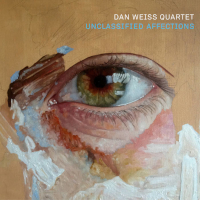 When not working as a sideman alongside some of today’s most innovative musicians, drummer Dan Weiss has been developing an impressive discography as a bandleader. Although he has recently gravitated towards trios, for Unclassified Affections (Weiss’ fifth release for Pi Recordings), he makes ample use of the dynamic possibilities of a sympathetic all-star quartet, featuring trumpeter Peter Evans, guitarist Miles Okazaki, and vibraphonist Patricia Brennan.
When not working as a sideman alongside some of today’s most innovative musicians, drummer Dan Weiss has been developing an impressive discography as a bandleader. Although he has recently gravitated towards trios, for Unclassified Affections (Weiss’ fifth release for Pi Recordings), he makes ample use of the dynamic possibilities of a sympathetic all-star quartet, featuring trumpeter Peter Evans, guitarist Miles Okazaki, and vibraphonist Patricia Brennan.
Weiss’ stylistic palette is diverse and these new compositions, written specifically for these musicians, range from introspective to extroverted. Some of Weiss’ projects bridge the tenuous genre divide between jazz and metal – Starebaby for example. But he also has a fondness for oblique melodicism, and that aspect comes to the fore on Unclassified Affections. The eight idiosyncratic pieces are nuanced, exploring subtleties of rhythm and texture, and while Weiss’ technical facility is evident, it is in service to the group, which carefully defines the distinctive features of each piece together.
Brennan leads the opening title track with languid arpeggios, followed by Okazaki’s spare pointillism before Evans joins with understated refrains, as the three melodies intertwine. Weiss slowly enters and the number builds to a somber groove with spirited collective improvisation, culminating in a mesmerizing finish. The angular “Holotype” possesses a similarly intriguing structure, with Weiss playing a visceral series of rhythmic variations while his bandmates trade blistering post-bop solos – when Weiss solos midway through, he seamlessly continues the number’s rhythmic flow. There are also moments of the hard-driving metallic intensity Weiss often favors: Okazaki engages his distortion pedal for “Mansions of Madness,” which has some knotty ensemble charts and a bracing a cappella solo from Evans, while the infectious, intermittent groove of “Existence Ticket” has several slow moving, interlocking parts.
Most of these multi-layered creations are dominated by an enigmatic lyricism. Brennan is key and her shimmering opening to the haunting “Perfection’s Loneliness” is a case in point. “Consoled Without Consolations” is another multi-layered meditation, with each musician adding light and shadow, and “Plusgood” continues the air of reflection, as Evans – a master of extended techniques – explores the full range of his horn with gentle phrases that echo the others’ musings. The album concludes with “Dead Wall Revelry,” which slowly accumulates a sense of controlled tension courtesy of shape-shifting rhythms that drift from 6/8 waltz-time to hocketed techno beats; capped by an atmospheric finale featuring Evans at his most lyrical, it’s a beautiful finish to a beguiling program.
Repeated listens reveal layers of rhythmic and contrapuntal interplay, framed by deliberate silences, with ample room allotted for spontaneous extrapolations. As with any Weiss project, the musicianship is exceptional: Brennan’s sonorous mallet work contrasts with Evans’ pointed trumpet lines; while Okazaki’s guitar weaves intricate webs of harmony and dissonance, all underpinned by the leader’s hypnotic contributions. Weiss is one of the most compelling drummer-composers on the current scene and Unclassified Affections is another exceptional effort from this unclassifiable artist.
–Troy Collins
Sarah Wilson
Incandescence
Brass Tonic BTR 003
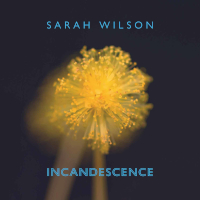 Incandescence, the latest album from Bay Area-based trumpeter and composer Sarah Wilson, is a lively, genre-defying effort. Released on her own Brass Tonic Records and co-produced by Grammy-winning producer Hans Wendl, the record showcases Wilson’s new sextet Brass Tonic, and is inspired by visual art, rhythm-driven brass bands, and the joy of collective music making. Drawing on her earlier activist work and time spent in ensembles like the Montclair Women’s Big Band, Wilson brings a clear feminist vision to her new ensemble’s lineup: Wilson combines an all-female frontline – herself, alto saxophonist Kasey Knudsen, and trombonist Mara Fox – with the rhythm section of guitarist John Schott, bassist Lisa Mezzacappa, and alternating drummers Jon Arkin or Tim Bulkley. Although the band formed only three years ago, its roots date back to Wilson’s work in drummer Kenny Wollesen’s Himalayas marching band and her 1990s experiences in artistic activism with the Bread & Puppet Theater, which shape the communal spirit of Brass Tonic.
Incandescence, the latest album from Bay Area-based trumpeter and composer Sarah Wilson, is a lively, genre-defying effort. Released on her own Brass Tonic Records and co-produced by Grammy-winning producer Hans Wendl, the record showcases Wilson’s new sextet Brass Tonic, and is inspired by visual art, rhythm-driven brass bands, and the joy of collective music making. Drawing on her earlier activist work and time spent in ensembles like the Montclair Women’s Big Band, Wilson brings a clear feminist vision to her new ensemble’s lineup: Wilson combines an all-female frontline – herself, alto saxophonist Kasey Knudsen, and trombonist Mara Fox – with the rhythm section of guitarist John Schott, bassist Lisa Mezzacappa, and alternating drummers Jon Arkin or Tim Bulkley. Although the band formed only three years ago, its roots date back to Wilson’s work in drummer Kenny Wollesen’s Himalayas marching band and her 1990s experiences in artistic activism with the Bread & Puppet Theater, which shape the communal spirit of Brass Tonic.
During a 2023 artist residency in Krems, Austria, Wilson became enamored with the bold, large-scale abstract paintings of Viennese artist Thomas Reinhold, a pioneer of German “Junge Wilde” (New Painting), which became the basis for several pieces on Incandescence. She composed them inside the State Gallery of Lower Austria, often working next to Reinhold’s paintings, who she eventually met and bonded with over a shared love of John Coltrane. The influence of Reinhold’s art is evident in the contemplative atmosphere of Wilson’s compositions, which are bathed in color and light, layered and textured like a canvas.
Whether or not one is familiar with those concepts when listening to this program, it is obvious that something different is at play here. There’s a poetic looseness in the group’s shared rapport which enables the music to be free, yet lyrically precise. Each musician sounds committed to the collective, their convivial interplay and spacious phrasing underscored by a sense of communality in every solo and ensemble passage. Even individual solos emerge gracefully and organically rather than as spotlighted performances driven by individual bravado – a trope of many male-dominated lineups.
Brass Tonic challenges genre (and gender) boundaries, inviting listeners on a journey that is equal parts intellectually stimulating and emotionally satisfying. Wilson’s unconventional compositions are deceptively complex, drawing from jazz, classical, and world music. For those familiar with South and West African rhythms, there are ample traces here of those warm, danceable folk forms. Surprising in its restraint, Incandescence offers an alternative view of jazz artistry, drawing as much inspiration from Reinhold’s lofty abstract paintings as it does from street-level, community-minded brass band traditions, to bring joy to both the head and the heart.
–Troy Collins
John Yao And His 17-Piece Instrument
Points in Time
See Tao 005
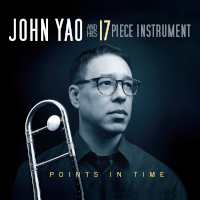 It’s been ten years since the premier of John Yao’s big band. Yao established himself as a promising voice in the New York City jazz scene when his debut big band album Flip-Flop received critical acclaim in 2015. In the ensuing years he turned to more manageable endeavors: a quintet; a co-led sextet with trumpeter Jimmy Smith; and the three-horn band Triceratops. Now, with a decade’s worth of experience behind him, the trombonist, composer, and bandleader returns with Points in Time, a new recording that bridges his past and present, fusing the bold swing of bebop with a contemporary orchestral flair, reaffirming the big band as a vital mode of traditional jazz expression.
It’s been ten years since the premier of John Yao’s big band. Yao established himself as a promising voice in the New York City jazz scene when his debut big band album Flip-Flop received critical acclaim in 2015. In the ensuing years he turned to more manageable endeavors: a quintet; a co-led sextet with trumpeter Jimmy Smith; and the three-horn band Triceratops. Now, with a decade’s worth of experience behind him, the trombonist, composer, and bandleader returns with Points in Time, a new recording that bridges his past and present, fusing the bold swing of bebop with a contemporary orchestral flair, reaffirming the big band as a vital mode of traditional jazz expression.
For part of the session’s repertoire, Yao includes re-imaginings of some of his favorite originals, transposing small-band compositions into expansive new big band arrangements. A veteran of the Vanguard Jazz Orchestra, Yao makes a conscious effort to weave traditional elements into his arrangements, embracing the timeless tenets that make big band music so exhilarating, like passionate horn solos, brass opposing reeds, and shout choruses that raise the roof. A prime example is “Not Even Close,” which Yao originally wrote for his quintet in tribute to VJO founder Thad Jones. He revised the angular tune for big band, crafting spirited exchanges between saxophones and brass reminiscent of Jones’ own “Little Pixie.” He wrote the upbeat “First Step” around the same time, which makes its long overdue premiere here. Another reinvention is the brooding “Triceratops Blues,” the first number he penned for his three-horn band.
He also includes new pieces that document his evolution as an orchestrator. A storytelling quality distinguishes this new work; his cinematic arrangements evoke film scores, with narrative compositions unfolding in dramatic arcs. Several pieces are inspired by periods in Yao’s life. His marriage to Natalie and her battle with cancer inform “Early Morning Walk,” a lyrical ballad that conveys the tenderness of early love and the strength required to endure illness. “Song for Nolan” is its emotional counterpoint, a joyful ode to fatherhood based on the birth of their son following her recovery.
But Yao isn’t averse to modernism; the fractious “The Other Way” is a bold venture into 12-tone technique that balances exuberant muscularity with complex harmonic movement. Yao has been commissioned to contribute compositions and arrangements for high school ensembles, and the album is bookended by updated versions of two such commissions, the energetic original “Upside,” with its layered horn voicings and rhythmic drive, and a lively, abstracted version of Herbie Hancock’s “Finger Painting.”
Charting his creative growth, Points in Time is a new artistic high for Yao. More than just a collection of swinging tunes, this album boasts sophisticated compositions that convey genuine emotion, offering a perfect entry point for listeners unfamiliar with Yao’s work. For longtime fans, it marks the triumphant return of an artist reclaiming his vision of the big band format.
–Troy Collins